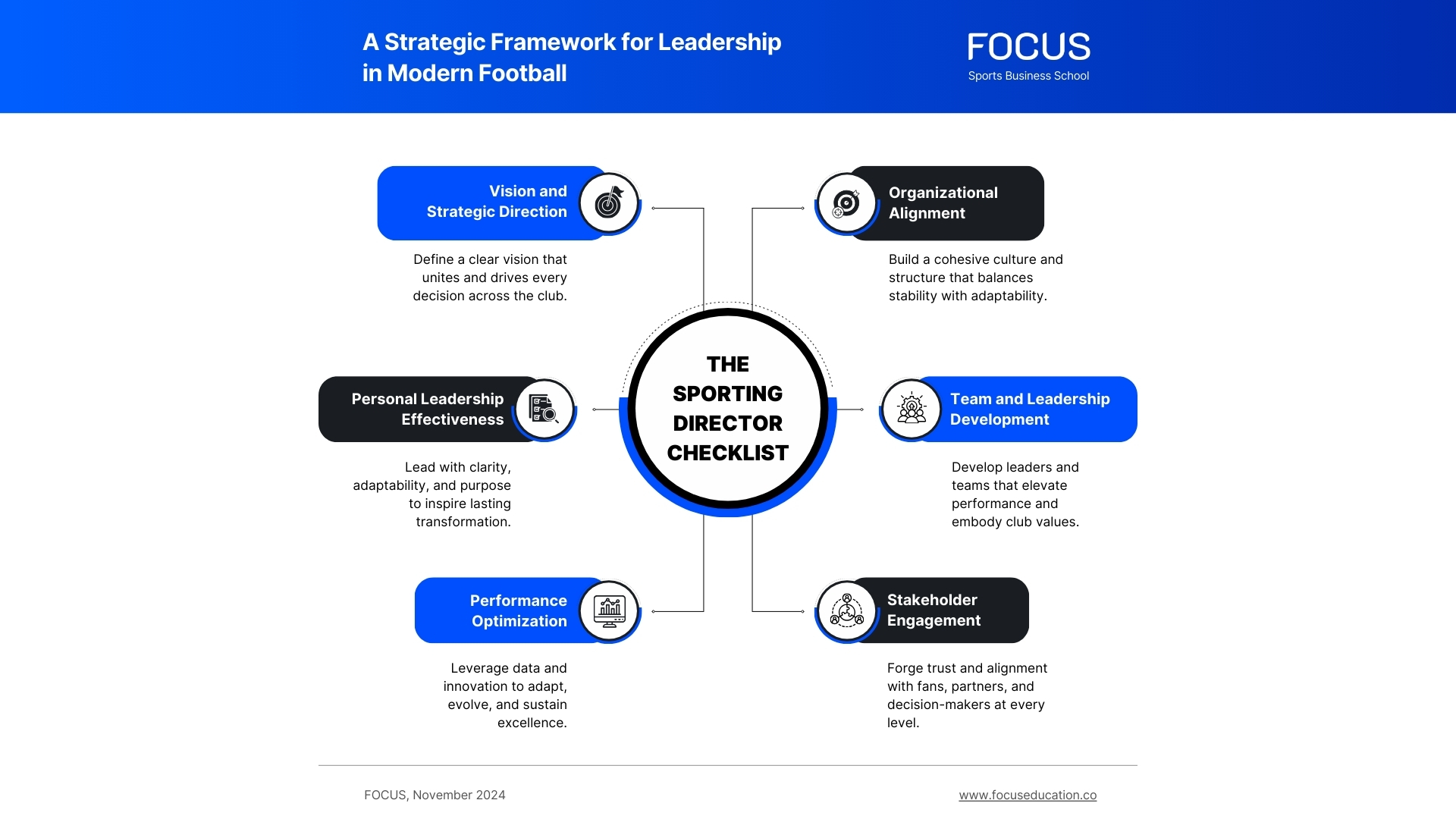In the ever-evolving landscape of football, a Sporting Director’s role goes beyond simply finding and signing the best players. Success in this role requires a deep understanding of the club’s culture, business model, and long-term goals. To build a recruitment strategy that not only strengthens the team on the pitch but also contributes to the club’s financial stability, a Sporting Director must ask—and answer—a series of critical questions.
These questions help align recruitment decisions with the broader context of the club’s ethos, financial situation, and future direction. Let’s explore why these questions are crucial and how they help Sporting Directors make informed decisions.
1. What Does My Owner Actually Want from My Scouting? Do I Know? How Do I Find Out?
This is the starting point for any Sporting Director. Understanding what the owner wants from scouting and recruitment is critical because the owner’s vision shapes the club’s priorities.
- Are they focused on immediate success?
This might require scouting experienced players who can make an instant impact. - Or are they looking to develop long-term value?
In this case, youth investment and scouting for under-the-radar talents become key.
How to Find Out:
Open lines of communication with ownership are essential. Set up regular meetings to discuss their vision and expectations. Make sure that scouting reports and recruitment activities align with what the owner views as success.
2. What Is the Business Philosophy of the Club? Profit? Value? ROI?
Every club has a different business philosophy, which heavily influences recruitment strategy.
- Is the focus on maximizing profit through player trading?
If so, identifying undervalued talent and enhancing their value becomes a primary focus. - Or is the goal to build a valuable team and brand, even if immediate returns aren’t evident?
This might involve a mix of investing in young talent and high-profile signings that enhance the club’s global presence.
Why It Matters:
A Sporting Director must align recruitment with the club’s business goals. For example, a club focused on maximizing ROI will have different targets than one focused on building global brand value.
3. How Does the Club Make Money? Does the Club Want to Make More?
A clear understanding of how the club generates revenue is crucial for recruitment. Football clubs can make money through several avenues: matchday revenue, broadcasting deals, sponsorships, and most importantly for some clubs, player trading.
- Are transfers a primary revenue stream?
If yes, scouting should prioritize players who are likely to appreciate in value. - Does the club want to improve its financial position?
The Sporting Director’s role might then include increasing the club’s commercial appeal by signing high-profile players who can attract sponsorship and media deals.
What This Means:
Your recruitment strategy needs to reflect how the club currently generates money and how it aims to increase revenue. Players who offer both footballing talent and commercial appeal might be prioritized.
4. Is Player Trading a Significant Revenue Stream? What Is the Associated Business Plan?
For many clubs, player trading isn’t just a part of the game—it’s a core component of the business model. The Sporting Director must work within this framework, identifying players who can be bought, developed, and sold at a profit.
- Is there a plan in place to sell players at peak value?
This might involve a scouting strategy that focuses on younger, high-potential players who can be sold on for a large fee.
Action Point:
Align scouting efforts with the club’s business plan. Understanding the timing of when to buy and sell players is crucial to maximizing profits from player trading.
Learn how to build winning recruitment strategies from Les Reed, the football executive who revolutionized Southampton FC’s talent pipeline and generated over £400 million.
5. Is There a Desire for Investment in Youth?
Youth development is often the backbone of a sustainable recruitment strategy. Clubs like Ajax and Borussia Dortmund have thrived by investing heavily in their academies and scouting young talent from across the globe.
- Does the club have the infrastructure and patience to develop young players?
If so, youth scouting should be a priority, with the aim of integrating these players into the first team or selling them at a profit.
Long-Term Impact:
Investing in youth requires patience but can be highly rewarding. A strong youth academy also builds the club’s reputation and attracts further talent.
6. Is There a Desire for Investment in Stars?
Investing in star players often provides immediate on-field benefits, and it can also significantly enhance a club’s global standing.
- Is the club looking to increase its profile with big-name signings?
Star players can not only win matches but also drive merchandising and sponsorship revenue.
Balancing Act:
While star signings can be expensive, they may pay off through increased commercial appeal and on-field performance. It’s about balancing the cost with the expected return.
7. Is There a Desire for Investment in Experience?
Every team needs a balance of youth and experience. Experienced players bring leadership and stability to a squad, qualities that are invaluable during tough periods of the season.
- Is the club interested in signing older, more experienced players?
If so, scouting should focus on players who might not have resale value but offer intangible benefits like leadership and tactical intelligence.
Key Takeaway:
Recruitment of experienced players should be aligned with the club’s need for immediate stability or mentorship for younger players.
8. Is It All or a Mixture of All?
Most clubs will require a balanced approach, combining youth investment, star signings, and experience. The Sporting Director’s challenge is finding the right blend based on the club’s current situation.
- How do you balance short-term success with long-term sustainability?
Practical Application:
A balanced recruitment strategy means diversifying your scouting network to identify both young potential and established talent. Understanding the club’s goals and how to mix these different types of investments is crucial.
9. How Is It Funded?
Even the best recruitment strategies need to be financially viable. The Sporting Director must know how much the club is willing to invest and where that money is coming from.
- Is the recruitment budget reliant on player sales? Sponsorships? Broadcasting rights?
Financial Management:
Understanding the funding model allows the Sporting Director to plan recruitment with an eye on financial sustainability, ensuring the club remains competitive while staying within budget.
10. How Will My Contribution Be Judged? What Does Success Look Like for Me and Who Decides?
Finally, as a Sporting Director, you need to know how your performance will be evaluated.
- Is success measured by on-field results, financial gains, or both?
Clarify Expectations:
Ensure that success metrics are clear from the outset. This helps guide your recruitment strategy and ensures that your goals align with those of the ownership and board.
Conclusion: Aligning Recruitment with Culture and Business
These questions aren’t just theoretical exercises—they are the foundation for a well-rounded, effective recruitment strategy that blends the club’s culture with its business objectives. A Sporting Director who understands and answers these questions can create a recruitment strategy that brings success both on and off the pitch.
The ability to balance player development, financial sustainability, and on-field results is the hallmark of a great Sporting Director. By asking the right questions and aligning with the club’s goals, you can build a legacy that benefits the club for years to come.










